Has anyone ever successfully used an EZ our on a stuck bolt?
Discussion
Just wondering. I cannot for the life of me understand why they make these, because as far as I can tell, they just don't work.
- Title should be EZ Out, sorry. Or easy out. Or not-out-in-the-slightest-except-out-of-time-because-you've-been-trying-until-it's-dark-outside (although that wouldn't fit)
Edited by stoocake on Sunday 16th September 18:07
Yes! Spark plug broke in half in my sister's Ka and we used an 'Easy Out' to remove it.
Details:
Update 8/1/11.
Some good weather today gave opportunity to try and sort out this long standing issue.
This was purchased last week (£4.99 :shock: )
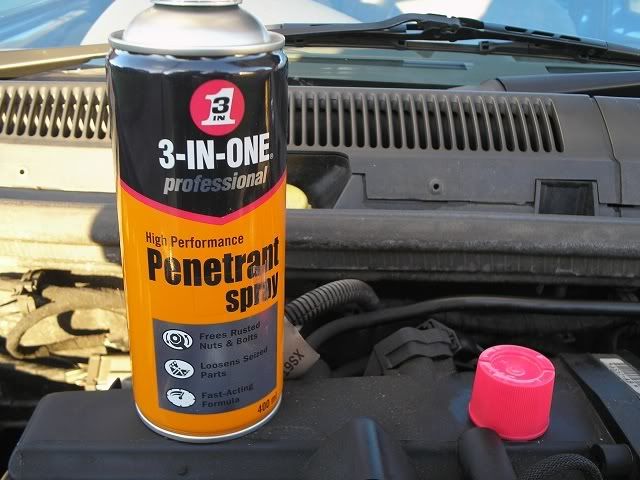
Apparently the equivalent to Plusgas they had in Halfords. Daily sprays to soak the plug.
Also purchased a set of screw extractors like these:

As ever, a hammer was found to be invaluable. 8)
Lined up the screw extractor with the broken plug and plenty of 'taps' from the hammer to try and get it secured in place.
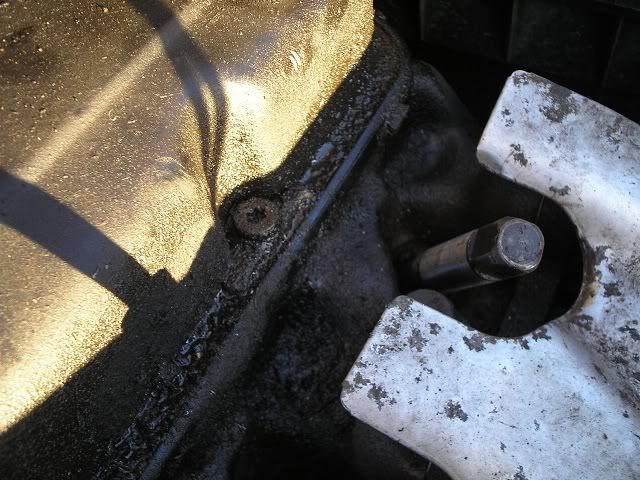
Then fashioned a cunning tool (comprising a socket, an allen key and a random metal pole) to allow the extractor to be used.
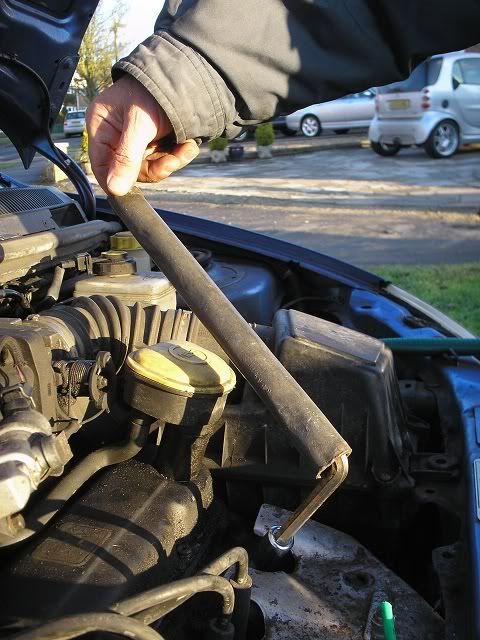
Plenty of elbow grease....and then 'click' - winner!
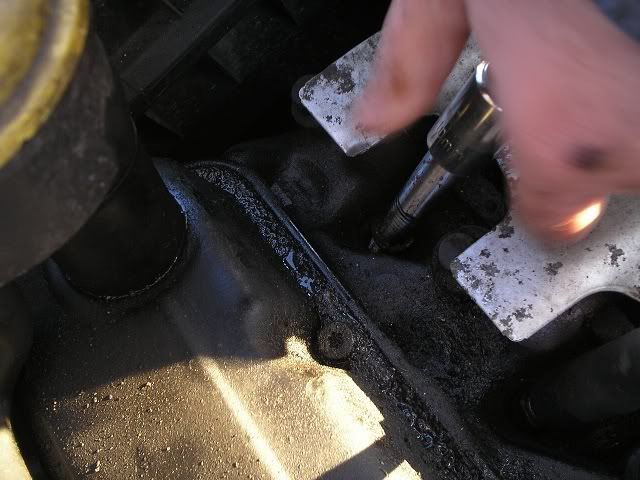
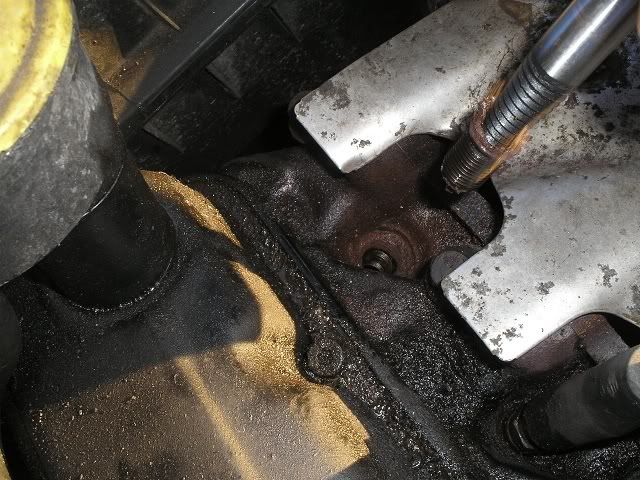
Hurrah!
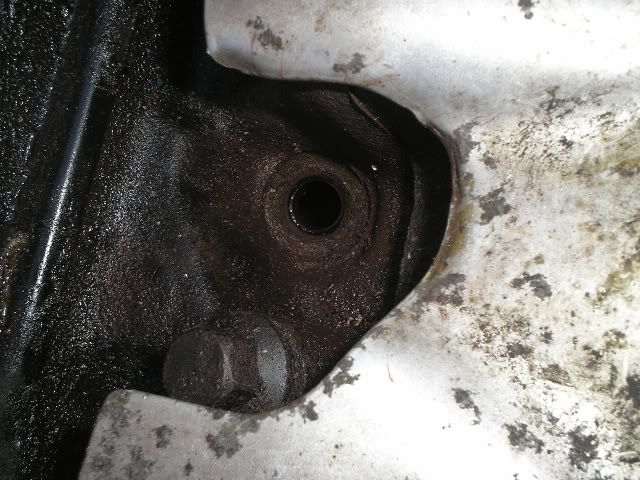
Unfortunately, this is what was left of the end of the spark plug. :?:roll:
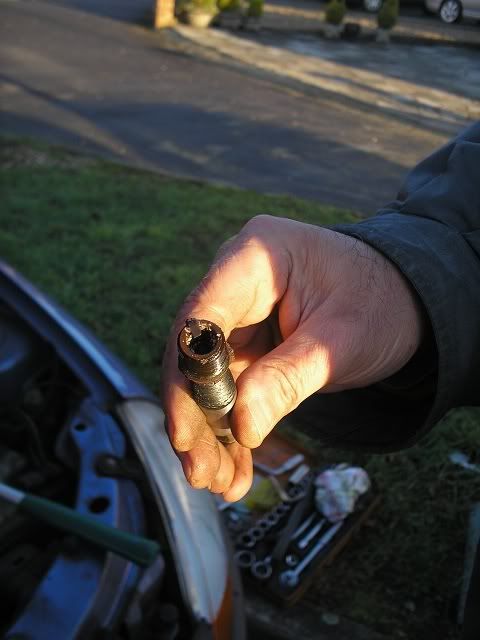
Which of course raised the question of the debris remaining in the cylinder - the electrode, bits of ceramic, which really, in the scheme of things, is not a good place for them to be.
So, how to remove? A quick search online suggested a number of methods including a vacuum, magnet on a stick, shaving foam.
We decided to remove the rest of the spark plugs and then crank the car, hopefully blowing any crap out. Did it, and pleny of fluid came out (no doubt all that penetrating fluid) but not really obvious debris that I could see.
We decided to take a risk - plug in the other 3 cylinders, start the car and with luck, the debris should be blown out. Of course, the risk is that it'd ruin the cylinder but b ks to that, this car was £250, it's do or die time. One has to balance it up!
ks to that, this car was £250, it's do or die time. One has to balance it up!
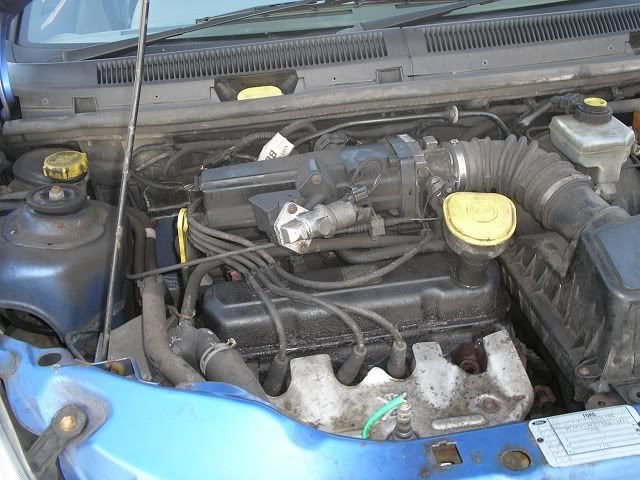
Started, revs, plenty of crap blowing out, left it for a few mins. Now, with luck, the cylinder was clear.
New NGK spark plugs:
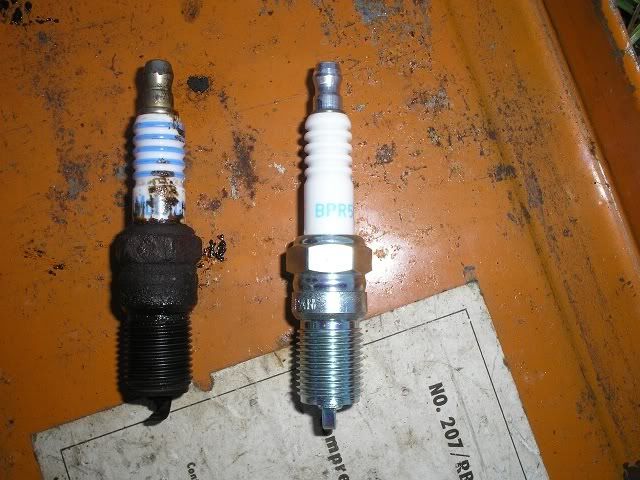
With baited breath, the engine was started...perfect. Very smooth, much more than previous to all these issues. Given the state of the old spark plugs, that's hardly surprising though. Car left to idle, no issues, 20 minute test drive (60-70mph cruise), no issue. I assume (maybe wrongly) that if there was crap in the cylinder and it was going to cause failure/seizure/explosion/mass destruction, it would have manifest itself during the drive.
I am happy.
Details:
Update 8/1/11.
Some good weather today gave opportunity to try and sort out this long standing issue.
This was purchased last week (£4.99 :shock: )

Apparently the equivalent to Plusgas they had in Halfords. Daily sprays to soak the plug.
Also purchased a set of screw extractors like these:

As ever, a hammer was found to be invaluable. 8)
Lined up the screw extractor with the broken plug and plenty of 'taps' from the hammer to try and get it secured in place.

Then fashioned a cunning tool (comprising a socket, an allen key and a random metal pole) to allow the extractor to be used.

Plenty of elbow grease....and then 'click' - winner!


Hurrah!

Unfortunately, this is what was left of the end of the spark plug. :?:roll:

Which of course raised the question of the debris remaining in the cylinder - the electrode, bits of ceramic, which really, in the scheme of things, is not a good place for them to be.
So, how to remove? A quick search online suggested a number of methods including a vacuum, magnet on a stick, shaving foam.
We decided to remove the rest of the spark plugs and then crank the car, hopefully blowing any crap out. Did it, and pleny of fluid came out (no doubt all that penetrating fluid) but not really obvious debris that I could see.
We decided to take a risk - plug in the other 3 cylinders, start the car and with luck, the debris should be blown out. Of course, the risk is that it'd ruin the cylinder but b
 ks to that, this car was £250, it's do or die time. One has to balance it up!
ks to that, this car was £250, it's do or die time. One has to balance it up!
Started, revs, plenty of crap blowing out, left it for a few mins. Now, with luck, the cylinder was clear.
New NGK spark plugs:

With baited breath, the engine was started...perfect. Very smooth, much more than previous to all these issues. Given the state of the old spark plugs, that's hardly surprising though. Car left to idle, no issues, 20 minute test drive (60-70mph cruise), no issue. I assume (maybe wrongly) that if there was crap in the cylinder and it was going to cause failure/seizure/explosion/mass destruction, it would have manifest itself during the drive.
I am happy.

Good replies guys! Nice write up on the spark plug removal! nice job.
I'm trying to remove the steel exhaust studs from the aluminium casting on a Honda CBR600. The bike is a 95 model and I expect these are original so they're pretty well corroden in. I've got 3 of the 6 studs out, but the last 3 will not budge.
The problem is, I can't drill them any further. I have 2x boxes of very high quality steel drill bits and I've got some way into them, but I just can't move any more metal from them - perhaps the heat has strengthened them over the years.
Been trying for days to get these out and getting fed up now.
Tried penetrating spray, welding a nut on, drilling out, ez-outs, swearing, heating (propane torch), swearing more and even tried a powerfully built company director, but no luck with any of the above.



I'm trying to remove the steel exhaust studs from the aluminium casting on a Honda CBR600. The bike is a 95 model and I expect these are original so they're pretty well corroden in. I've got 3 of the 6 studs out, but the last 3 will not budge.
The problem is, I can't drill them any further. I have 2x boxes of very high quality steel drill bits and I've got some way into them, but I just can't move any more metal from them - perhaps the heat has strengthened them over the years.
Been trying for days to get these out and getting fed up now.
Tried penetrating spray, welding a nut on, drilling out, ez-outs, swearing, heating (propane torch), swearing more and even tried a powerfully built company director, but no luck with any of the above.



Drill through the bolt at right angles and stick a long hard rod (  ) through it to give you a big lever and twist it, ok the diameter of the hole cant be that big and therefore your lever wont be that stiff but its a similar idea to welding a nut on.
) through it to give you a big lever and twist it, ok the diameter of the hole cant be that big and therefore your lever wont be that stiff but its a similar idea to welding a nut on.
I'd try freeze spray on bolt, blow torch/heat gun on casing., but i see that you have had little luck with that.
Or, weld a nut on again and use a good impact driver?
 ) through it to give you a big lever and twist it, ok the diameter of the hole cant be that big and therefore your lever wont be that stiff but its a similar idea to welding a nut on.
) through it to give you a big lever and twist it, ok the diameter of the hole cant be that big and therefore your lever wont be that stiff but its a similar idea to welding a nut on. I'd try freeze spray on bolt, blow torch/heat gun on casing., but i see that you have had little luck with that.
Or, weld a nut on again and use a good impact driver?
Thanks again everyone. I've left it soaking in 3-in-1 penetrating spray over night, tomorrow I might attack it with the welder again in the hope that the heat cycles so something to break the corrosion.
Failing that, masonry drill bits will be tried!
Anymore success stories? The few I've read here tonight are the only ones I've ever heard - the internet is full of people telling you not to use them.
Failing that, masonry drill bits will be tried!
Anymore success stories? The few I've read here tonight are the only ones I've ever heard - the internet is full of people telling you not to use them.
I've never managed to get them to work.
But if you have anything still poking out, give one of these a try, workes a treat, as the harder you turn, the harder it grips.
http://www.ebay.co.uk/itm/IMPACT-STUD-EXTRACTOR-RE...
But if you have anything still poking out, give one of these a try, workes a treat, as the harder you turn, the harder it grips.
http://www.ebay.co.uk/itm/IMPACT-STUD-EXTRACTOR-RE...
Willhook said:
drill it to correct tapping size and just tap a new thread in the old bolt.
I'll have another bash tomorrow night and try a little more force than I have until now. I've been a bit ginger til now as I've been worried about making things worse. If it comes to drilling and tapping, I'm hoping the masonry bits work as no amount of steel bits and cutting oil would make any progress - just smoke

Gassing Station | Home Mechanics | Top of Page | What's New | My Stuff





